13 MOST COMMON ASSIGNMENTS IN BSC NURSING
As a nursing student, you need to understand the subjects you are taught. How do you ensure you get this right? Take advantage of the assignments as they help you determine whether or not you can respond to the questions asked, or even come up with the needed information or hold a discussion regarding a particular topic. Assignments in BSC nursing are not new, as your professor or instructor will no doubt expose you to them. They do this either mid-way through the topic or after you are done. The beauty of these assignments is that they help prepare you for becoming a registered nurse. So, having an idea of what to expect can help go a long way. Below are the 13 most common assignments in BSC Nursing and the guidelines you can follow.

Fundamental Communication Skills in Nursing
The assignments here usually come in the form of essays. Therefore, you will need to reference your work in the end. Under this topic, you can be asked why effective personal communication is a key skill in nursing. So, how should you answer?
You can respond to it by outlining a communication theory related to nursing. Also, you can identify two essential communication skills in building a rapport and then further analyze their value. Importantly, your essay should answer the question and be supported by evidence. Also, referencing the sources can help you support your answer. Don't forget you are doing the academic style.
Nonetheless, your essay should be balanced such that two-thirds comprises a detailed analysis. Another important thing not to forget is how you structure the essay from the introduction to the conclusion. Put it in a way that guides your reader through. Before you submit, ensure you proofread to confirm the terminologies and grammar is on point.
Professional Identity
Nurses need to establish their status in society. They can do this by protecting the public image of their profession. However, there are still stereotypes despite the efforts they put in. Therefore, the true nature of nursing is masked, and the nurses' professional identity is challenged.
As a student, you may encounter a question related to stereotypes. Your professor may require you to discuss how the professional identity of nursing is affected by its public image. How do you go about this?
You can begin by talking about the professional identity of nursing. What does it mean? Ensure you outline this. Moreover, you can give an example of how the media portrays a stereotype of nursing. Further, you can explain how the media's representation challenges the professional identity of nursing.
Since this is a matter of concern, ensure you give suggestions on what you feel should be done to improve the professional identity of nursing.
Once again, support your essay with related references from different publications and articles.
The Good Nurse
Have you ever wondered what being a good nurse entails? There could be one value that makes you one. Therefore, as an assessment, your professor may require you to first respond to the question, "what makes a good nurse?" Next, he may need you to pick a single attribute, value, or behavior portrayed by a good nurse. Further, you may need to discuss how you have developed and demonstrated this value/behavior/ attribute in your practice. Sounds like a heavy task there.
You can respond to such a question by briefly outlining the values, behaviors, and attributes expected of a good nurse. You can go ahead and choose one and explain it. Moreover, you can show how other stakeholders, such as colleagues and clients, view your chosen value, behavior, or attribute.
Since these values are set standards, you can assess your potential concerning these standards. If you learn or observe anything about the value, you've chosen during your practice, ensure to discuss it. Lastly, don't mention the effects of learning this value, behavior, or attribute to your practice.
Long-Term Conditions
Under this topic, you may be required to assess how effective one approach is for self-management of specific long-term conditions (LTC). You can analyze self-management principles, realized benefits, and potential challenges.
When responding to such essays, ensure you outline the key self-management principle. You can then connect it with wider initiatives and policies. Also, you should choose and outline the pathophysiology of a long-term condition and the patient's social, physiological, and physical needs.
Additionally, you should use relevant sources to discuss the benefits and challenges of using the one approach in self-management concerning the LTC you have chosen. Don't forget to recommend how the self-management approach is used in long-term conditions. Your summary is incomplete without this important bit.
Once you are done, proofread and correct any grammar or terminology mistakes; you may have a committee in the course of writing the academic essay. Accuracy is key in BSC nursing, and never should you ignore this.
Core Values, Knowledge & Skills for Mental Health Nursing
Have you ever used a mental assessment tool? There are high chances you have in the course of your practice. Therefore, your instructor may require you to give a detailed analysis of how you used it and carry on with the analysis to assess how useful the tool is. How do you respond to this sample assessment?
You can begin by having an overview of the impact of mental illness on individuals and their families. Having briefly given this overview, you can link it to the need for a mental health assessment tool.
Since your professor requires you to give your encounter with the tool, you should describe in detail the context in which you deployed this assessment tool and how you established your professionalism.
Remember to reference your analysis with related academic literature on mental health. In your conclusion, have a backed-up recommendation on the assessment tool and mention whether or not it has any implications in your further practice.
Safety in Adult Nursing Care
As a nursing student, you may have interacted with a vulnerable adult client during your practice. Therefore, based on this experience, your professor or instructor may require you to analyze the proper approach toward medicine management and the probable or actual patient safety risks involved.
When responding to such, base your essay on risks on medicine management and administration, as well as self-management of medication. They range from adherence, concordance and crushing tablets, and so on. Importantly, don't forget to mention the vulnerable adult patients who include those suffering from confusion, dementia, physical disabilities, mental health issues, unconsciousness, stroke, Parkinson's Disease e.t.c
In your case study, ensure your introduction outlines what you are talking about and its importance. After the introduction comes the major part of the essay, where you outline your adult client's situation, the specific vulnerabilities and related risks, and how you managed your client and maintained safety.
In your conclusion, have evidence-based recommendations on medicine management with vulnerable clients. If this has implications for your future practice, add it to the conclusion.
Person-Centred Communication
Your essay may be for you to outline the communication strategies a person with a disability can use with others; family members, friends, caregivers, or their partners. How do you tackle such?
It would be best if you had several barriers to communication, such as individuals and those they communicate face. Explore these factors extensively. Moreover, you should include several approaches that can come in handy to assess the needs of these individuals with learning disabilities.
As a nurse, you need to know these individuals, and this calls for building a relationship. How do you do this? Include that as well in your essay. If there are other alternative communication approaches you can employ to know the individuals better, ensure you outline them too.
Other people's values and beliefs about people with learning disabilities impact their communication effectiveness. So, explore this area in your essay. If there are support services designed to help promote effective communication with such persons, talk about the same.
What should you have in your conclusion? Briefly identify how you can monitor how the communication strategies are implemented and how to determine whether they will be successful.
Complex Presentations in Mental Health Care
A sample assignment may require you to write an essay that examines and critiques an intervention with a client with issues related to complex mental health. In your essay, you should show you are knowledgeable and understand the related concepts per the module.
How should you structure such an assignment? Your introduction can have what you aim at in the essay, such as the intervention you will explore and the rationale behind its selection. Also, give your reader its context, and you can discuss how common the complex mental health issue the intervention addresses is.
As you explain the intervention, be clear. Why is this important? It helps convince your reader that you understand what you are talking about. Moreover, for your essay to be balanced, ensure you have both strengths and weaknesses of the intervention.
Remember to include related references in the essay and as a part of your conclusion, bring out the main points of what you consider important regarding the intervention.
Exploring The Nurse Patient/Client Partnership
You may get an assignment that requires you to write an essay reflecting and exploring the clinical instances where nurses and other healthcare professionals interact or have discussions with their clients (the patients). In this essay, ensure you pay attention to the specific aspects of their discussions, such as the language and terminology used and how they represent the nurse's behavior, attitude, and values. Besides, ensure you discuss how this influences the relationship between the nurse and the patient/client.
Nonetheless, let your essay reflect on what implications such interactions have on the nurse's practice. What's more, if there is something of importance you can apply in your future practice from the same, ensure you discuss it.
Notably, be sure to leave an example of a discussion between a nurse and a patient you observed in the appendix section of your essay. Once again, reference your essay with related academic literature and other recent health disciplines. Don't submit your assignment without proofreading.
Communication in Adult Nursing Practice
You need to express your communication skills as a nurse in practice. Thankfully, there is a topic that helps you understand that. You can get a related assignment to help you determine whether you are knowledgeable enough on the same. For instance, you may be required to write one that reflects your communication skills in practice. The key thing is to use the modules as a source of the concepts you will use to respond to such a question.
For instance, you can link your points to the module and show how you can safely communicate with patients and be effective. As expected, it won't always be smooth. Rather, you may get involved in complex and challenging situations with your client. Thankfully, effective communication can be of help.
Moreover, you can discuss your practice's positive and negative aspects. You can also make recommendations regarding your future practice. Whatever reflections you have in the essay, ensure you have their pieces of evidence. Therefore, reference and proofread your work before you submit it.
Principles of Effective Care Delivery
This is another area of physical and mental health you can get assignments from. Your professor or instructor will give you a timeline on when to submit your essay. Some of the questions you can come across will cover the contemporary care delivery models available, service delivery, and an evaluation to enhance mental health recovery. On the other hand, your assignment may involve nursing management and leadership, risk management, promoting service users' mental and physical needs, and clinical supervision for quality care and performance.
Regardless of the specific area tested, your instructor may give you a reference list earlier. With this provision, you can research from the sources provided, gather knowledge and learn, then write your essay. Also, you can reference other readable sources you can find. The reference is important to help support your essay.
To be safe from grammar, definition, and other similar mistakes, ensure you proofread your work before submitting it.
Ethical Principles in Nursing Practice
Ethical issues are arising in different fields, and nursing is no exception. Therefore, you may be required to write an essay discussing the ethical decisions or actions in nursing practice. If this is the case, you must choose an ethical decision or action to focus on in the essay. Remember, it could be from observation, on an area of interest from the recent media reports, or you can make it yourself.
The ethical decision or action you focus on could have either a positive or negative outcome. If you are to work in groups, ensure you consult with the facilitator to suggest which one to take. What are some of the things you should cover in the essay? They include; the ethical and legal issues arising in nursing practice, the course of action the involved health officials in the issues can take, and the arguments either supporting or disputing the actions.
Nonetheless, the essay should have an ethically sound decision in the end. If you have any recommendations on what should take place instead, include them in your conclusion.
Personal Philosophy For Nursing
In this topic, you may be given the assignment to write an essay on philosophy for nursing that can guide your future practice. Well, how do you maneuver around this? As a BSC Nursing student, you look forward to a point when you will be registered, and you no doubt have a certain vision. What exactly is it? You can explain all these in your essay. Also, how do you individually interpret nursing? What does it mean to you as a person? Include this as well.
Moreover, discuss some of your values and beliefs about your nursing career. You may also consider your role in nursing as a practitioner or what they mean. Also, why not include the tension between the service priorities and the patient and how well they can be addressed personally?
Remember, you should back up your essay with nursing literature and other appropriate references. You are developing into a professional nurse so express that knowledge.
Nursing students have a lot to learn, writing reports and exams. On the other hand, professors and instructors also do their part to avail the modules and any beneficial and important reference links for more information. Therefore, a student can take advantage of these. Also, if you are a BSC nursing student, there are assignments you can make good use of them to gauge yourself and your level of understanding. If you feel like there is still more knowledge and information you need to discover, utilize the available related resources.
Nonetheless, your professors or instructors may have different rules regarding their assessments. However, when you go through them early and know what is expected of you, there's nothing to worry about. These 13 common assignments in the BSC nursing list are a great starting point.
Post a comment...
13 most common assignments in bsc nursing submit your assignment, attached files.
Bachelor of Science in Nursing (BSN) Overview

- BSN Specialties
- Admission Requirements
- Core Concepts
- What To Expect
- Should I Get A BSN
Are you ready to earn your online nursing degree?
Average bsn program length, average credits required for a bsn, bsn average earning potential.
According to the American Association of Colleges of Nursing , healthcare settings see a difference in nursing practice based on a nurse’s education level. Employers have a strong preference for bachelor of science in nursing (BSN)-prepared nurses, as they are linked to better patient outcomes. Hospitals seeking Magnet status also prefer to hire graduates of BSN programs.
Nurses benefit from BSN programs for the comprehensive curriculum that teaches more than clinical skills. Students learn critical thinking, decision making, leadership, evidence-based practice, and nursing informatics.
Although salaries depend on many factors, BSN-prepared nurses routinely average more per year than nurses from associate degree in nursing (ADN) programs. Additionally, a BSN prepares the nurse for graduate school and career advancement, factors that contribute to higher earning potential.
A BSN degree may soon become mandatory to practice . In December 2017, New York became the first state to mandate nurses earn a BSN within 10 years of initial licensure.
Earning a BSN increases your credibility with patients and administration. It can also open doors to greater opportunities outside of patient care, including working as an analyst, consultant, case manager, leader, or in sales.
Opportunities With a Bachelor of Science in Nursing
Good career mobility, path to advancement, job potential, skills learned.

Featured BSN Specialties
Beyond working in hospitals as RNs, individuals with a BSN degree find careers as geriatric nurses, OBGYN nurses, and neonatal nurses. Check out the descriptions below to learn more about these specialty occupations.
Registered Nurse
RNs lead teams of nurses to care for patients in clinics, hospitals, and nursing homes. They work the day or night shift to monitor and treat caseloads of patients, including infants, adults, and the elderly. In 16 states, RNs also prescribe medications. An ADN or BSN degree is required to become a registered nurse.
- Salary: $73,300
- Job Outlook: 7% growth from 2019-29
Geriatric Nurse
Geriatric nurses work in nursing care facilities and hospitals to provide medical help to seniors. These professionals have worked as RN nurses and gained clinical experience working with elderly individuals. They have a unique understanding of diseases such as osteoporosis, Alzheimer’s, and dementia.
- Salary: $64,870
- Job Outlook: Positive growth in coming years
OBGYN Nurse
OBGYN nurses provide medical services to women and infants. Under the direction of obstetricians and gynecologists, they deliver care in clinics, private doctor’s offices, and hospitals. They may focus on helping women in various stages of reproduction, including pregnancy, labor, or postpartum.
- Salary: $60,000
Travel Nurse
Travel nurses work on a contract basis. High demand areas such as operating rooms, intensive care units (ICU), and emergency rooms need travel nurses across the country. Their assignments last for weeks or months. International work may run as long as two years.
- Salary: $79,000
Neonatal Nurse
Neonatal nurses administer care to sick or critically ill infants in the ICU or neonatal intensive care unit. The job includes working with pediatricians and nursing staff, while also providing instructions to parents. Most hold years of experience as RNs, and neonatal nursing certificates.
- Salary: $60,797
How Much Will I Make With a Bachelor’s Degree in Nursing?
$32.64 Hourly Salary
$7,123 Monthly Salary
$85,539 Annual Salary
Source: PayScale
How to Get a BSN
1. decide type of bsn program.
There are several types of BSN programs, including traditional, bridge, and online. Figure out what works best for you.
2. Find BSN Program
After deciding which factors are important to you in a school, use our degree finder to find programs that fit your criteria.
3. Apply to BSN Programs
Common application requirements include GPA, essay, references, CV or resume, volunteer experience, and prior coursework.
4. Secure funding for BSN programs
There are many ways to finance your degree, including financial aid, grants, scholarships, and loans .
5. Attend BSN classes
Complete the required courses and obtain clinical hours to get hands-on experience. Learn how to work independently with your own patients.
6. Graduate with a BSN
Congrats on earning your degree! Now you can take the NCLEX-RN and become a registered nurse (RN), or continue your education and get your MSN.
Types of Bachelor’s Degrees in Nursing
Admission requirements for a bsn program.
A BSN applicant’s admission requirements depend on their status as a student. Schools set different criteria and credit requirements for freshmen, transfer students, and international students. However, most BSN degree programs maintain the following common admissions requirements for all students:
- High school or college transcripts
- SAT or ACT scores
- A CV or resume
- A GPA of at least a 2.5 or 3.0
Schools often expect applicants to have completed classes in microbiology, physiology, chemistry, and anatomy. Some institutions may give preference to candidates with volunteer service experience.
Core Concepts in a BSN Program
Bachelor’s of science in nursing programs include two phases: a didactic portion, which is taught in classrooms, and a clinical learning experience. Through lectures and reading assignments, students learn to promote safe solutions and good health, prevent and manage disease, reduce risks, and improve patient outcomes. Candidates gain foundational knowledge through core courses such as:
- Community health nursing
- Pharmacology
- Leadership and management
- Nursing informatics
- Research and statistics
- Pathophysiology
Upper division courses explore speciality areas such as gerontology, global public health, maternal-child care, and pediatrics.
Clinical & Lab Components in a BSN Program
BSN programs may require students to spend time in a hospital, clinic, or lab stimulation setting in which they work an actual shift. During clinical experiences, candidates work under licensed RN mentors as they deliver medications, assess and diagnose patients, plan interventions, and monitor outcomes. By the end of the program, students can work independently with their own patients. Clinicals offer the opportunity to:
- Shadow working RNs
- Apply classroom skills on patients
- Network with future employers
- Build confidence
What to Expect From an Online RN-to-BSN Program
Students earning their RN-to-BSN or second degree BSN have the option of attending an online program instead of traditional face-to-face classes. Online RN-to-BSN degrees let students take core classes in anatomy, pharmacology, and psychology remotely. While distance learners do not have to meet on campus for their foundational courses, they must complete clinicals or labs in their local communities. During a program’s clinical component , students work in labs or at their local hospitals, clinics, or nursing care facilities. Students are often required to find their own clinical experiences.
Nothing, aside from the format, differentiates online degrees from traditional programs. Online learners receive the same degree and education, learning from professors who work on campus. Instructors use online learning platforms to meet live with students or assign online work.
Learn more on this page about how online programs work.
Should I Get a Bachelor’s Degree in Nursing?
Your personal financial situation, time constraints, and family obligations may impact your decision to pursue a 4-year degree. Take a look at the pros and cons of pursuing a bachelor’s degree in nursing:
Advantages to a BSN
Disadvantages to a bsn, explore bsn programs.

The Best Online BSN Programs
Pursuing a BSN online provides academic freedom and flexibility for aspiring nurses. Check out this guide for a list of the best online BSN programs.
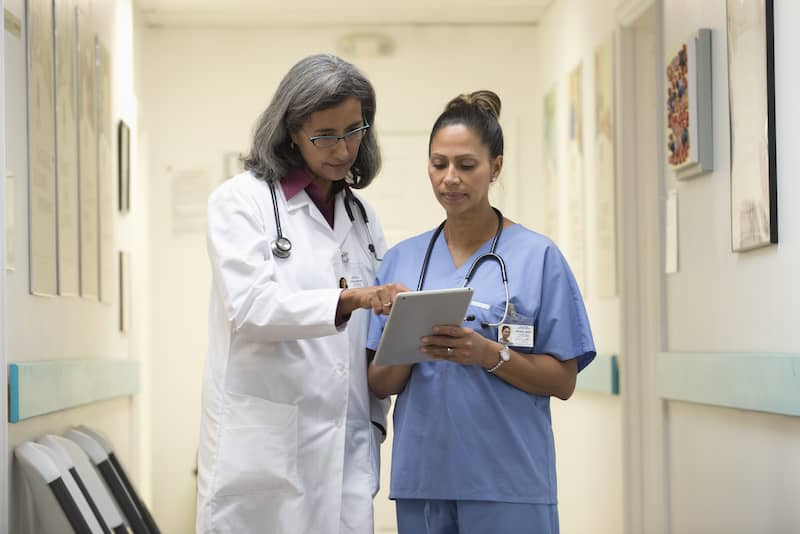
The Best Online ABSN Programs
ABSN programs are a great option for aspiring nurses who already hold a bachelor’s degree in another field. Learn more about fast-track BSN degrees and find the top online programs.

The Best Online RN-to-BSN Programs of 2024
Are you an RN interested in completing your undergraduate nursing education? These top RN-to-BSN programs can be completed in just 12-24 months.

Four-Year Bachelor of Science in Nursing (BSN) Programs
The traditional route to a bachelor of science in nursing (BSN) spans four years and admits high school graduates. Read on for details about four-year BSN programs.

The Best Online LPN-to-BSN Programs
Are you an LPN ready to move up in your career? Explore our rankings of the best online LPN-to-BSN programs to find the best fit for your professional goals.
Whether you’re looking to get your pre-licensure degree or taking the next step in your career, the education you need could be more affordable than you think. Find the right nursing program for you.
You might be interested in

HESI vs. TEAS Exam: The Differences Explained
Nursing schools use entrance exams to make admissions decisions. Learn about the differences between the HESI vs. TEAS exams.

10 Nursing Schools That Don’t Require TEAS or HESI Exam

For Chiefs’ RB Clyde Edwards-Helaire, Nursing Runs in the Family

- Cancer Nursing Practice
- Emergency Nurse
- Learning Disability Practice
- Mental Health Practice
- Nurse Researcher
- Nursing Children and Young People
- Nursing Management
- Nursing Older People
- Nursing Standard
- Primary Health Care
- RCN Nursing Awards
- Nursing Live
- Nursing Careers and Jobs Fairs
- RCNi events calendar
- CPD webinars on-demand
Nursing degree: written assignment tips from prep to feedback
Beverley ramdeen posted 29 august 2023 - 16:57.

NHS pay review process ‘in dire need of reform’
Care innovations: how to spark ideas on placement and influence change in practice, how can i become more confident in delegating nursing tasks, can i refuse to care for a patient as a nursing student, 5 most read articles, nhs pay: would a separate pay spine benefit nurses, what will the nurse pay offer for 2024-25 look like, band aid remembered: how one nurse inspired a phenomenon, trauma at work: do you get the help you need to recover from distressing incidents, help my revalidation is looming and i’m worried i’ve left it too late to get started, other rcni websites.
- RCNi Learning
- RCNi Nursing Careers and Jobs Fairs
- RCNi Nursing Jobs
- RCNi Portfolio
We use cookies to enhance your online experience. To find out more, please read our Cookies Notice and Privacy Notice .

Nursing (Adult) BSc (Hons)
What makes adult nursing at worcester special.
Our exciting and transformational Adult Nursing degree has been developed collaboratively with practice partners, service users and students. At its heart is the recognition that nursing is an evolving profession with individuals working as part of today’s interdisciplinary healthcare teams in a wide range of settings.
You will learn how to make a positive impact on the lives of adults with a diverse range of health and dependency needs, including physical and emotional care requirements, particularly addressing the needs of the ageing population.
We train our Adult Nursing students to be articulate, flexible, decision makers able to promote health and well-being, prioritise effective care and implement evidence-based nursing practice. They will work collaboratively with inter-professional teams, service users and their families, respecting their rights, choices and wishes.
Key features
- On successful completion of the BSc (Hons) Adult Nursing programme, you will be eligible to apply for Registration with the Nursing and Midwifery Council.
- Our Adult Nursing students gain the knowledge, abilities and skills to provide holistic care across a variety of settings with 50% of the course embedded in the practice setting.
- Our outstanding Skills and Simulation Centre allows you to safely practice nursing interventions in realistic environments, including a replica hospital ward.
- Support throughout your course from a Personal Academic Tutor, who is usually a lecturer on your course, and who will remain with you throughout your studies.
- Opportunities to complete either a UK or international elective placement, for example, in Finland, Denmark, Ireland and Tanzania.
Browser does not support script.
Register your interest
Enter your details below and we will keep you up to date with useful information about studying at the University of Worcester.

Study Adult Nursing BSc in Dudley
From September 2024, you have the choice to study Adult Nursing BSc (Hons) in Worcester or at the Black Country and Marches Institute of Technology, located in Dudley (subject to NMC approval).
The course will be taught by the same experienced lecturers at both venues, but the Black Country and Marches Institute of Technology will be ideal for you if you currently live near Dudley and want to stay in your local area during your studies. There will also be opportunities to undertake placements in the local area, with the University’s excellent industry links, as well as gaining good support from our lecturers throughout their time studying.
Entry requirements
- 112 UCAS Tariff points from 3 A Levels (for example, BBC at A Level)
- BTEC Level 3 Extended Diploma DMM or above
- Access to Higher Education Diploma - with 45 credits at level 3 (with at least 30 credits at Merit or Distinction)
- GCSE C/4 or above in English (English Literature or English Language accepted) and Mathematics. Please see the section below for acceptable alternative Maths and English Language qualifications
Students are required to demonstrate health and character sufficient to ensure safe and effective practice. This includes a satisfactory Enhanced DBS and occupational health assessment .
T Levels may be used to meet the entry tariff requirements for this course. Find out more about T levels as UCAS tariff points here.
If your qualifications are not listed, please contact the Admissions Office for advice.
Don't quite meet the entry requirements? Consider our Nursing Associate FdSc or Health and Social Care FdSc .
Other information
Applications.
The University will consider each application on its individual merits and will recognise a range of qualifications not currently included in the Tariff. If you do not meet the minimum entry requirements outlined above, please contact the Admissions Office for advice.
Further information about the UCAS Tariff can be obtained from www.ucas.com .
Selection Event
Shortlisted candidates will be invited to attend a selection event, and will be expected to demonstrate that they have an understanding of the requirements of nursing. Information about this day will be sent to all invited applicants.
Useful resources
There are a number of resources available to help you prepare an application to the Nursing programme.
Examples include the UCAS Guides , as well as the Health Education England Nursing careers and Nursing and Midwifery Council websites.
Disability Information
If you are worried that your disability or physical/mental health problem will affect your nursing application, please refer to our disability concerns document for more information.
Acceptable alternative Maths and English Language qualifications
Acceptable alternative mathematics qualifications:.
- Functional Skills Level 2 Mathematics
- Essential Skills Level 2 (Wales) Maths
- NARIC approved GCSE C/4 or above equivalent International qualification
- University of Worcester GCSE Equivalency Exam in Mathematics
Acceptable alternative English Language qualifications:
- Functional Skills Level 2 English
- Academic IELTS of 6.0 with a score of at least 5.5 in each component.
- University of Worcester GCSE Equivalency Exam in English
- Essential Skills (Wales) Level 2 English
Course content
What will you study and when.
You will study a combination of core, field of practice and practice learning modules. The exact modules you will study will depend upon your chosen field of practice.
Our courses are informed by research and current developments in the discipline and by feedback from students, external examiners and employers. Modules do therefore change periodically in the interests of keeping the course relevant and reflecting best practice. The most up-to-date information will be available to you once you have accepted a place and registered for the course.
Teaching Staff
You will be taught by a teaching team whose expertise and knowledge are closely matched to the content of the modules on our nursing degree. The team is made up primarily of Registered Nurses from different backgrounds, with expertise in their chosen field of practice/area of expertise. Teaching is also supported by the inter-disciplinary and multi-agency team, when specialist knowledge is required. Contributions by service users, carers and their families, provides opportunity for them to share their lived experiences, with service users as appropriate having a role in the assessment process.
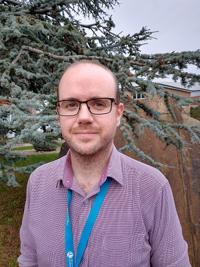
Mr Jodie Walker-Haywood
Qualifying as a Registered Nurse in 2007 from University of Worcester, Jodie initially worked at Worcestershire Acute Hospital on the Infectious Diseases and Stroke Unit before specialising in Genito-Urinary and Contraceptive Medicine (Sexual Health Services) in Birmingham & Solihull where he spent the next 13 years before joining the University as a Lecturer in 2021.
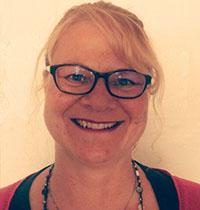
Kathy Clarke
Kathy Clarke is interested and passionate about undergraduate nursing, teaching and learning with the application of theory to clinical practice. She is student focused, interested in widening participation and is committed to supporting students and apprentices reach their full potential. Within the recruitment and selection nursing team Kathy leads on the recognition of prior learning.
She has worked as a registered nurse in a wide range of clinical settings, predominately within an acute care setting including medical, surgical and critical care settings. Since 2011 Kathy has taken on the course lead role for programmes including Critical Care; Foundation Degree Health and Social Care and more recently Foundation Degree Nursing Associate Apprentice programme working in partnership with healthcare employers from across the region.
Alison Lewis
Alison Lewis is a senior lecturer on the Pre registration Nursing BSc course here at University of Worcester. Before coming to the University, Alison had worked for most of her career with children young people and families. Her first post was on a very busy children’s ward at University college Hospital London. Alison then undertook her health visiting qualification and worked across a number of areas of London before moving to work in Warwickshire. Alison has undertaken project posts working with homeless people, helped start clinics for non-English speaking families and latterly worked with young people who were expecting their first baby (Family Nurse Partnership).
At Worcester Alison is interested in supporting student nurses with their community placements and encouraging newly qualified nurses to take up posts in the primary care sector. She also works alongside the team’s international lead to develop and support elective placements across Europe and worldwide including Thailand, Tanzania, India, Norway and Denmark.
Samantha Meredith
Samantha Meredith has professional experience as a Staff Nurse in Accident and Emergency, a Community Staff Nurse, a District Nursing Sister and a Practice Educator.
Qualifications
- Bachelor of Science with Honours – Adult Nursing
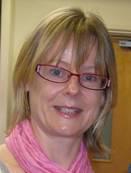
Helen Ford has a PhD from the University of York, an MSc In Health Sciences, a Post-Graduate Certificate in Teaching and Learning in Higher Education and a BSc Hons (Clinical Nursing Studies). Helen is registered with the Nursing and Midwifery Council.
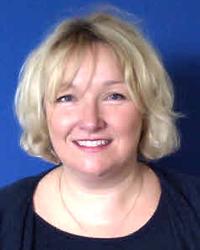
Louise Carter
Lou Carter is a Registered General Nurse and has an MSc in Advancing Practice.
Adult Nursing at Worcester

Tolu Adelaja
Having completed her studies and now working as a nurse, Tolu plans to progress with her career and continue to build her skills. “A career in nursing opens up several doors and so I can’t wait to see what the future holds,” she said.
Tolu said she chose the University of Worcester because she wanted a change of environment and to be out of her comfort zone. “I liked the quiet family-oriented vibe Worcester offered which was something I was looking for,” she added. “Being in Worcester helped me hone-in on my independence and learn how to make friends from different backgrounds in a new, unfamiliar, but exciting environment.”
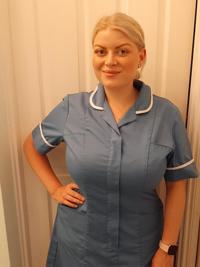
Becky Shuck
Student Becky Shuck went from working as a beauty therapist five years ago to volunteering to work on the NHS frontline during the Covid-19 pandemic. Now she is celebrating her graduation after completing a Nursing degree. After witnessing the care of nurses first-hand, she knew this was the career for her, and she is now working full-time as a nurse.
She said: “It feels surreal to be graduating, I still have to pinch myself that I finished my degree and I'm working as a registered nurse. The three years have gone so quickly and the support during my degree has been exceptional. It has broadened my skills, including those other than just nursing, such as being a course representative, representing fellow students’ interests. Going from a beauty therapist to a nurse is something I would never have done if I didn't have the support from the University. I will always be thankful and grateful for all the opportunities the University has given me.”
Nursing student Becky, of Longbridge, Birmingham, was one of around 450 University of Worcester students who put themselves forward to work on the frontline last spring, including those studying to be nurses, midwives, paramedics and physiotherapists.
Becky now hopes to work in major trauma in the future and has even considered doing a Master’s.

Amber Hartley
Amber is now working as a Practice Nurse after completing her degree in Adult Nursing at the University of Worcester
“I still cannot believe that I achieved a First Class Honours,” said Amber. “Studying and working as a student nurse throughout the pandemic was definitely challenging. I was thrilled when I received my grades because then I knew that all the hard work had paid off!”
Amber discovered that she was dyslexic a year before she started university. "Learning how to live with dyslexia was difficult for me, but I was able to overcome the challenges with the help of the University of Worcester staff. They were excellent at supporting and encouraging me throughout the three years. They directed me to a study skills tutor and I received extra time for my exams. The help I received did not only aid my studies, it also gave me the tools to manage my dyslexia after my course. Receiving a First Class degree was a great life accomplishment and I believe anyone can succeed if they put their mind to it.”
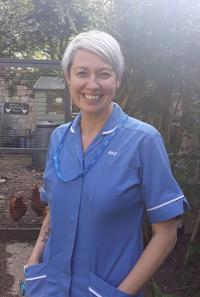
Rachel Bray
Rachel Bray achieved her life-long ambition to become a Nurse and is now part of the Evesham Neighbourhood Team, providing care in the community.
“It was really hard work, but I absolutely loved it,” said Rachel. “It was such a brilliant course. The tutors were really supportive; there were some tough times that I had to deal with, but they were brilliant. To someone else thinking about a Nursing career, I would just say go for it, it’s never too late, and also take it a day at a time.”
Rachel has now been accepted to do a Master’s in Evidence Based Healthcare at Oxford University alongside her work.
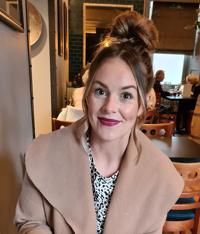
Karen Burgoyne
Karen Burgoyne, a mature student from Ayr, achieved a First-Class Honours degree in Nursing during the pandemic. Karen has now secured a role as a Band 5 staff nurse in the Accident and Emergency department at Ayr Hospital.
“Studying during the Covid-19 pandemic was by no means easy and has been a real eye opener of an experience but also an empowering one,” said Karen. She feels that the experience provided her with "the resilience and confidence ... to adapt and work under challenging circumstances."
Karen was diagnosed with dyslexia during her studies and was able to access additional support. “I started to retain information better, my academic writing improved and with the drive and determination this gave me, I started to get better grades,” she said, “I feel so proud that I did it. I finally achieved my dream job as a nurse and look forward to a future in nursing and the experiences and possibilities that will arise from this amazing role.”
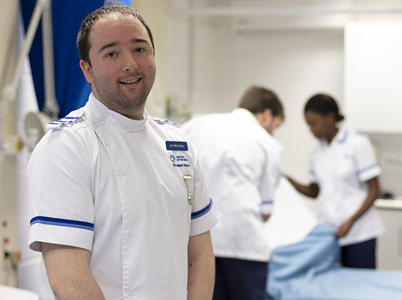
£5,000 support for Adult Nursing students
The Government announced that, from September 2020, eligible students on Nursing, Midwifery, Physiotherapy, Occupational Therapy and Paramedic Science courses will receive a payment of at least £5,000 a year, which they will not need to pay back.
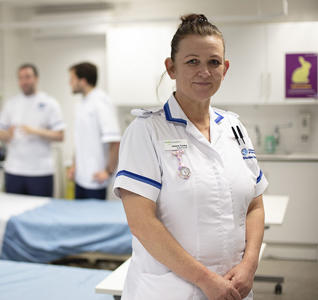
Adult Nursing BSc (Hons) Accreditation
Adult Nursing BSc (Hons) is accredited by the Nursing and Midwifery Council (NMC)
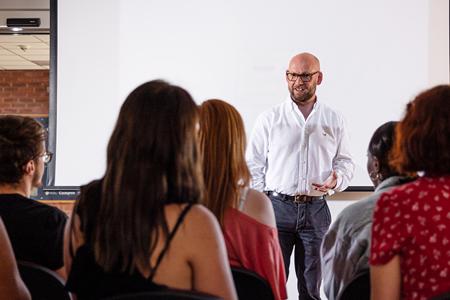
Book your place at an Open Day to discover more about Adult Nursing
Want to know why so many students love studying Adult Nursing at Worcester?
Our Open Days are the perfect way to find out.

Teaching and assessment
The University places emphasis on enabling students to develop the independent learning capabilities that will equip you for lifelong learning and future employment, as well as academic achievement. A mixture of independent study, teaching and academic support from Student Services and Library Services, and also the personal academic tutoring system enables you to reflect on progress and build up a profile of skills, achievements and experiences that will help you to flourish and be successful. Study skills are embedded into the early stages of the course to help promote student achievement and confidence with learning and assessment.
You will be taught through a combination of interactive workshops, lectures and seminars. Case studies (developed in partnership with service users) support a scenario-based approach to learning which facilitates small group activities and discussions, leading to shared and individual problem-solving and decision-making. A campus-based approach, complemented by appropriate use of both synchronous and asynchronous online learning including virtual learning environment collaborate, flipped classroom and e-learning packages, which promote personalised engagement with learning.
You will meet with your personal academic tutor 4 times in year one and 3 times in year 2 and 3.
At the core of the nursing programme is learning in a diverse range of clinical placements, learning in the real world which facilitates work-readiness, personal and professional development. Mandatory practice learning equates to 50% of the programme credit for each year. Your practice learning is mapped across the programme, gradually increasing as you gain in confidence, by year 3 you will complete over 55% of the programme in practice learning environments, supporting your transition from student to Registered Nurse. Your placements run in blocks across the year, with experiences normally in a minimum of 2 practice placements each year, in a setting appropriate to your chosen field of practice. The use of ‘spokes’ (visits to alternative placement settings) to maximise learning opportunities offered by diverse and non-traditional settings, offer exposure to opportunities to care for people from across the life-span, with mental and physical health needs and learning disabilities. Enhanced practice learning days, rooted in clinical practice, provide opportunities to consolidate learning, provide opportunity for reflection and inter-professional learning, including added value learning experiences and seeking additional support as necessary to promote inclusive learning in the practice setting.
While on placement you are supernumerary and are supported by a practice supervisor and assessed by a practice assessor, both having undergone appropriate preparation for their roles. Further support is provided by the inter-professional team, a nominated person (usually a member of the practice education team) and an academic assessor allocated for each part of the programme. You will have access to the internet and library resources whilst on placement.
You will be provided with opportunity to complete skills and simulated learning activities. All skills and simulation activities involve a range of people including students, peers, service users/carers, practitioners, technicians, academics and includes role play, ‘hands on’ practical skills sessions using a range of simulation manikins, video recording and playback. Formative feedback on performance is provided to facilitate safe and effective support for essential skills development, in state of the art simulation suites, replicating hospital and community practice learning environments. This learning is particularly important in year one, with 20 days allocated to prepare you for your practice learning experiences. This is reduced in year 2 and 3 to 10 days per year.
You will have opportunity to complete a UK or international elective placement, during Year 3, semester one. This can be either a 4-week or a 12-week experience, helping with the globalization of the programme and employability.
Download the course handbook
Contact time
In a typical week, a student will have around 15-18 contact hours of teaching during theory weeks. The precise contact hours will depend on the year of study as there is normally slightly less contact time in the final year in order to do more independent study. This allows for the completion of an independent studies project or dissertation, a sustained piece of individual work, which critically and ethically engages with professional practice, relevant to the students’ chosen field of practice.
Typically, class contact time per day will be structured around:
- 2 hours lead lecture
- 4 hours of seminar, workshop or tutorials
Nursing is campus-based, with approximately 85% of theory delivered on campus. Human anatomy and physiology for person-centred care, a year one, 15 credit module is delivered entirely online, supported by an e-learning package.
Whilst in placement, you will be expected to attend placement for 37.5 hours per week, experiencing the full range of hours expected of Registered Nurses. All practice learning hours, including skills and simulated learning must be formally recorded and signed for.
Independent self-study
In addition to the contact time, you are expected to undertake around 19.5-22.5 hours of personal self-study per week during theory weeks. Typically, this will involve locating and reading resources, including preparing for assessments.
Independent learning is supported by a range of excellent learning facilities, including The Hive and library resources, the virtual learning environment, and extensive electronic learning resources.
3 years full-time.
45-week timetabled year (50% theory and 50% practice learning), plus 7 weeks pre-planned holiday each year
Timetables are normally available one month before registration. Please note that whilst we try to be as student-friendly as possible, scheduled teaching can take place on any day of the week; and some classes can be scheduled in the evenings.
The course provides opportunities to test understanding and learning informally through the completion of practice or ‘formative’ assignments.
Each module has one or more formal or ‘summative’ assessments which are graded and count towards the overall module grade, all summative assessments must achieve a pass grade. Assessment methods include written examinations and a range of coursework assessments such as essays, reports, portfolios, performance, presentations and a final year independent studies project.
The precise assessment requirements for an individual student in an academic year will vary according to your chosen field of practice, but a typical formal summative assessment pattern for each year of the course is:
- Scenario-based essay
- Poster or leaflet with supporting paper
- Group presentation
- Unseen exam
- Reflective assignment (visual or written)
- Assessment of practice learning using the e-Practice Assessment Document, with evidence of medicines calculation test at 80%
- Care plan plus supporting paper or individual presentation
- Unseen, scenario-based exam
- Critically reflective assignment (visual or written)
- Assessment of practice learning using the e-Practice Assessment Document, with evidence of medicines calculation test at 90%
- Individual presentation
- Dissertation
- Assessment of practice learning using the e-Practice Assessment Document, with evidence of medicines calculation test at 100%
- Professional discussion
You will receive feedback on practice assessments and on formal assessments undertaken by coursework. Feedback on examination performance is available upon request from the module leader. Feedback is intended to support learning and you are encouraged to discuss it with personal academic tutors and module tutors as appropriate.
We aim to provide you with feedback on formal course work assessments within 20 working days of hand-in.
Programme specification
For comprehensive details on the aims and intended learning outcomes of the course, and the means by which these are achieved through learning, teaching and assessment, please download the latest programme specification document.
Nursing facilities
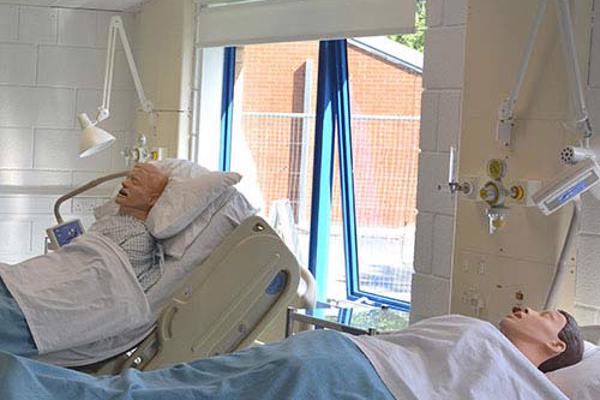
Our Clinical Skills and Simulation Centre is designed to develop your skills in a safe and supportive environment. The Centre includes clinical, therapy and home environments, the latest equipment, recording facilities and high-specification manikins.
Nursing, Midwifery, Physiotherapy, Occupational Therapy, and Paramedicine students study alongside one another in the Centre, giving a multidisciplinary experience that prepares you for today's modern workforce.
Find out more about clinical laboratories and equipment, please view our health facilities page or download our Clinical Skills and Simulation Centre booklet .
Clinical placements
Practice learning experiences in a range of hospital and community settings include flexible placements using a 'hub and spoke' design to maximise the learning opportunities offered by diverse and non-traditional settings. Students will complete 6 placements across the 3 years of the programme, which occur in blocks each semester, ranging from 8-12 weeks long, when students will work a 37.5 hour week. You will complete 2300 hours of clinical experience across the programme, using a combination of simulated learning and practice based learning.
You have an opportunity to complete a 12-week international elective placement during the first semester of year 3. Placement opportunities exist in Denmark, Norway and Ireland. Alternatively, you have the opportunity to complete a 4-week elective placement during the first semester of year 3, this can be based either in the UK (outside of Herefordshire and Worcestershire) or internationally.
Nursing Clinical Skills
The programme is professionally accredited by the NMC and achievement of our nursing degree normally indicates your Fitness to Practice and eligibility to apply to enter the NMC professional register, permitting use of the title Registered Nurse. Almost all graduates go straight into nursing employment, locally, nationally and in some instances internationally in a wide range of healthcare settings.
Students acknowledge that the programme improves their career prospects and future career aspiration. In 2019, 99% of leavers were in employment or further study, with 100% of the leavers in employment working in nursing roles. University of Worcester nursing graduates have made a significant contribution to the local NHS workforce during the Covid-19 pandemic.
Many nurses are employed locally, particularly with Worcestershire Acute Hospitals NHS Trust and Wye Valley NHS Trust. Other employment destinations include, Herefordshire and Worcestershire Health & Care Trust, Gloucestershire Hospitals NHS Trust and Dudley Hospitals. Local employing organisations are invited to meet with finalists and discuss career opportunities and further professional development.
A number of initiatives are embedded to promote employment, including mock interviews and support with CV writing during year 3. Personal Academic Tutors also offer support with career planning and writing personal statements. The nursing teaching team and the Careers and Employability Service ensure details of Trust recruitment events and individual jobs are publicised.
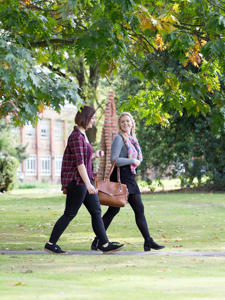
Careers and Employability
Our Graduates pursue exciting and diverse careers in a wide variety of employment sectors.
Fees and funding
How to apply, applying through ucas.
Nursing (Adult) - B740
UCAS is the central organisation through which applications are processed for entry onto full-time undergraduate courses in Higher Education in the UK.
Read our How to apply pages for more information on applying and to find out what happens to your application.
Apply to study at the University of Worcester's site.
Apply to study at the Black Country and Marches Institute of Technology site.
Get in touch
If you have any questions, please get in touch. We're here to help you every step of the way.
Jodie Walker-Haywood
Admissions office, school of nursing and midwifery - similar courses, midwifery msc (shortened) programme.
This shorted Midwifery MSc programme enables Registered Nurses (Adult) to complete a shortened curriculum leading to registration as an NMC registered midwife.
Nursing (Child) BSc (Hons)
Our Children's Nursing students are guided to consider the whole patient including their physiological needs, wellbeing and mental health.
Nursing (Mental Health) BSc (Hons)
Our Mental Health Nursing degree supplies you with the clinical skills and experience needed to provide high quality mental health care in real-life settings.
Nursing Degree Apprenticeship BSc (Hons)
The Nursing Degree Apprenticeship BSc (Hons) allows healthcare organisations to support employees to access nurse education, via the apprenticeship levy.

Admission office: +7 969 2834820 [email protected]
Department of Nursing
MBBS in Russia | MBBS in Moscow | Study Nursing in Russia | Study Nursing in Moscow | Nursing Education in Russia | Nursing Education in Moscow | MBBS Admission in I.M. Sechenov First Moscow State Medical University | MBBS Fee in I.M. Sechenov First Moscow State Medical University | Apply for MBBS Admission in I.M. Sechenov First Moscow State Medical University | How to Get Direct Admission in MBBS in I.M. Sechenov First Moscow State Medical University | Study Nursing in I.M. Sechenov First Moscow State Medical University | Nursing Fee in I.M. Sechenov First Moscow State Medical University | About Nursing
The Department of Nursing was opened in accordance with the order of the Rector and the decision of the Academic Council of the I. Sechenov Moscow Medical Academy (now the First Moscow State Medical University named after I. Sechenov) in February 2004.
The Department of Nursing is the first department of the First Moscow State Medical University named after I.M. Sechenov (Sechenov University), created to provide clinical training for students of the Faculty of Higher Nursing Education and Psychological Social Work (FVSO and SDP) in the direction of training 34.03.01 “Nursing” ( Bachelor’s degree) and the ACT in the specialty 34.02.01 “Nursing”. Since 2011, the department taught the discipline “Nursing” and the practice of obtaining the primary professional skills “Care of the sick” at the medical faculty in the specialty 31.05.01 “General Medicine”. Since 2014, the department also teaches the discipline “First Aid and Nursing” and the practice of obtaining professional skills and professional experience “Sister” in the specialty 31.05.03 “Dentistry”.
The department is located on the basis of the Clinical Center of the First Moscow State Medical University named after I.M. Sechenov (Sechenov University) in UKB number 3 at ul. Rossolimo house 11, page 5, students of the medical faculty, the dental faculty and the faculty of the MPF are engaged in this base. In 2017, the department allocated educational premises at the address: ul. 1st Borodino, house 2.
Since January 31, 2018, the Department of Nursing Year is part of the Medical and Preventive Faculty (MPF).
Scientific work of the department: Complex scientific theme of the department “Psychovegetative correlations in patients with coronary heart disease.”
The department has postgraduate study and a competition in scientific specialties: cardiology and internal diseases.
The department has a scientific student circle, research work is devoted to topical issues of clinical medicine.
Employees of the department conduct advisory and medical work in medical institutions in Moscow.
Admission is open
- Admission process
- Admission requirements
- Application form
- Admission 2021-2022
- Tuition fee
- Apply online
- Visa requirements
- Our representatives
- Russian embassies
- Airport pickup
Admission 2021-2022 is open now. Join to thousands of happy students in First Moscow State Medical University
Admission Office
Admission office for international students.
Adfress: 119991, Moscow, Trubetskaya street, house 8, building 2, Russia
Phone: +7 (969) 283-48-20
Email: [email protected]

Season’s Greetings from Sechenov University
University News | Student life in Russia | Student life in Moscow | News and events in Russia | News and events in Moscow | Study in Russia | Study in Moscow | Education in Russia | Education in Moscow | Study abroad in Russia | International students life abroad | Study abroad in Russia…

Sechenov University Maintained its Position in the 5-100 Project
- Faculties and Departments
- University Leadership
- FMSMU Worldwide
- Clinics of FMSMU
Copyright © 2020-2023 First Moscow State Medical University. All Rights Reserved.

First aid module for BSc. Nursing students in semester-I
First-aid module training is a low-cost, high-impact method of lowering morbidity and mortality. With the help of the Belgian Red Cross Evidence Practice Center, the Belgian Red Cross-Flanders, and a multidisciplinary expert panel, the Indian Red Cross Society developed evidence-based Indian first aid guidelines in 2014.

- About first-aid
- First aid and law
- Managing an emergency
- Resuscitation (Basic CPR)
- Recoverable position
- The initial examination from head to toe
- Hygiene and handwashing
About FIRST-AID
Basic first aid.
Before the arrival of an ambulance, a qualified paramedical or medical person, or before arriving at a facility that can provide professional medical care, first aid is the first assistance or treatment given to a casualty or a sick person for any injury or unexpected illness .
The objectives of first aid
The objectives of first aid are to (a) save lives, (b) prevent the deterioration of one's medical condition, (c) promote recovery, and (d) assist in safe transportation to the nearest healthcare facility.
The first aider
Any person who has earned a certificate from an authorised training authority demonstrating that he or she is qualified to administer first aid is referred to as a first aider.
FIRST AID AND THE LAW
The following subset of the guidelines is included:
A bystander or Good Samaritan ("someone who assists an injured individual in an emergency") such as a witness to an accident, may transport an injured person to the nearest hospital and should be permitted to depart right away. The eyewitness is required to disclose his or her address.
There are no questions to be asked. Any civil or criminal responsibility for the onlooker or Good Samaritan must be waived. A witness or Good Samaritan who calls the police or emergency services to report an injured person on the road cannot be forced to reveal his name or personal information over the phone or in person.
The sharing of the Good Samaritan's contact information will be optional. A doctor's or nurse’s failure to respond in an emergency involving a road accident (when he is required to offer care) is considered Professional Misconduct .
STEPS FOR MANAGING AN EMERGENCY
Although emergency situations differ widely, there are four fundamental measures that must always be followed:
STEP 1: Make the location as secure as possible
First and first, your own safety should always be prioritized. As a first responder, you should: Try to figure out what's going on. Look for any potential dangers, such as traffic, fire, or power cables; if you are placing yourself in danger, never approach an accident scene. Do everything you can to protect the injured person(s) and other individuals on the scene; be aware that the injured person's property is at risk. Theft is a possibility. So keep your safety in mind, and if an accident scene is unsafe and you can't aid without placing yourself at risk, call the police.
When coming into contact with the injured or sick person's blood or body fluids, it's also necessary to wash your hands and wear gloves or other protective gear.
As a first responder, you should always respect traffic laws; ask other persons to notify traffic about the accident; and, if possible, install a warning sign at a good distance from the accident, at least 30 meters on either side, to warn traffic. After the accident, remember to remove the warning signs; seek assistance from the police or emergency services; do not allow anyone to smoke near the accident site; turn off the engines of all cars involved in the accident, and try to apply the handbrake to keep vehicles involved in the accident from moving. You can also prevent rolling by placing something against the tires.
If there has been a head, neck, back, leg, or arm injury, any movement may aggravate the ailment. Only transport injured persons if: the injured person is at greater risk if he is left there, the situation cannot be made safe, medical help will not arrive soon, and you can do so safely.
STEP 2: Assess the injured person's health
You can assess the sick or injured person's condition if it is safe. Always make sure he's awake and breathing normally. Situations involving a loss of consciousness or difficulty breathing are frequently fatal. Inside the body, bleeding can occur and be life-threatening, even if there is no visible blood loss. This booklet explains resuscitation techniques (CPR), the recovery position, and other topics.
STEP 3: Seek assistance
After assessing the sick or injured person's condition, you can determine whether immediate assistance is required. If assistance is required, have a bystander contact for assistance. Request that he returns and confirm that assistance is being provided. If you call for assistance, have the following information ready: the location where assistance is needed (address, street, specific reference points, location; if in a building: floor, room); the telephone or mobile number you are calling from; the nature of the problem; what happened (car accident, fall, sudden illness, explosion, etc.); how many injured; nature of the injuries (if you know); what type of assistance is required: ambulance, paramedic, etc.
STEP 4. Provide first-aid care
When giving first aid, attempt to keep an ill or injured person warm and safe from the elements. If a person is severely hurt, nauseated, sleepy, or falls unconscious, do not offer him or her anything to eat or drink. Be mindful that being in an emergency scenario can be quite stressful for the injured or ill individual. Follow these easy guidelines to help him get through the ordeal: Identify yourself to the sick or injured individual, explain how you will assist him, and reassure him. This will aid in his relaxation; listen to the individual and express care and friendliness; make him as comfortable as possible.
RESUSCITATION ( BASIC CPR )
CPR is a procedure that combines cardiac chest compression with artificial circulation to deliver oxygen and circulation to a person who is unconscious until medical assistance arrives. When conducted with the heart pumping off, this is a life-saving first aid operation that boosts a person's chances of survival. If a person stops breathing in any of the following scenarios, CPR may be required:
Road accident, Heart attack or stroke, Suffocation, Drowning \Poisoning, Suffocation \ Smoke inhalation, Overdosing on drugs or alcohol, Suspected SIDS (sudden infant death syndrome)
To hold life, we need our hearts to pump oxygenated blood to our vital organs. To achieve this we want to be respiration and our hearts need to be pumping. Should both of these functions stop, our brain and different essential organs will begin to deteriorate (brain cells normally die within 3-4 minutes due to lack of oxygen) which will in the end lead to death.
‘Ventricular fibrillation is the most frequent result of cardiac arrest, brought on by way of a coronary heart attack. When this happens, the quality chance of survival for the patient is to have their heart ‘restarted’ with a defibrillator. These are carried on all ambulances, and can also be found in some public places (shopping centres, etc.).
These days’ defibrillators are very sophisticated and will talk you through the process, but you ought to be educated in the use of them earlier than trying to use one. However, even if you are skilled to use one, you must call an ambulance first, as this will give the casualty the nice danger of survival.
Even so, we want to keep the heart and Genius oxygenated as nice we can while assistance is on the way; this is when we begin Cardio Pulmonary Resuscitation (CPR).
How can response and consciousness be detected?
When a person is abruptly unable to respond to stimuli such as sound or pain and looks to be asleep, they are said to be unconscious. For a few seconds (as with fainting) or for prolonged periods of time, a person may be unconscious. Loud noises and shaking have little effect on those who have fallen asleep. They could possibly cease breathing or have a weak pulse. This necessitates rapid assistance. It is preferable if the victim receives emergency first help as soon as possible.
The AVPU scale (an acronym for "alert, voice, pain, unresponsiveness") is a technique for measuring and recording a patient's responsiveness, which indicates their state of awareness. It is based on the victim's eye-opening, vocal, and motor (motor) movements.
There are just four possible outcomes on the AVPU scale:
A-stands for alert
The individual is completely awake (although not necessarily oriented). The subject will open their eyes voluntarily, respond to voice (although confusedly), and exhibit bodily motor function.
V-stands for voices
Listening to and responding to other people's voices. When you speak to this individual, he responds in some way. It may be anything as simple as his opening his eyes, replying to your queries, or making a move. When encouraged by the rescuer's voice, these replies might be as little as a grunt, groan, or tiny movement of a limb.
P stands for pain
Perceiving and responding to pain. On the administration of pain stimuli, such as a central pain stimulus like a rub on his breastbone or a peripheral pain stimulus like pinching his fingers, the patient responds in any way. Patients with some level of consciousness (a completely awake patient would not require any pain stimuli) can respond by speaking, moving their eyes, or moving a bodily part (including abnormal posturing).
U stands for Unresponsiveness
Unresponsiveness (sometimes known as 'unconsciousness') is a kind of unresponsiveness. If the patient does not respond to speech or pain with an eye, vocal, or motor reaction, this result is noted.
How breathing can be Assessed
The airway may additionally be insufficient or obstructed, which can make respiratory difficult or not possible. The reason for airway obstruction may additionally be the following:
If there is a lack of throat muscle control, the tongue may also soak up and block the element of air. If reflexes are impaired, saliva might build at the back of the throat, impeding flight direction. Upchuck, blood, synthetic enamel, and other foreign things in the throat might potentially obstruct airflow.
To observe the breathing do the following:
Turn the patient around on his back if the patient is unconscious or not paying attention. sit on your knee near the patient the index and middle fingers of one hand should be used to lift the chin forward, while the palm of the other hand should be used to press the forehead backwards. the tongue will be lifted forward and the airways will be cleared by doing this manoeuvre. (see figure 2).

Pay attention to, feel, and describe the patient breathing. Check to verify if the patient is breathing after opening his or her airway. While staring down the victim's chest, position your cheek in front of his mouth (approximately 3-5 cm away) (towards his feet).
If you want, you can also place your palm in the centre of the patient's chest. By this, you can check if the patient is breathing properly using a variety of techniques: (See figure 3 above)
Keep a lookout for chest and abdominal movements. pay attention to breathing noises feel the air passing via the nose or mouth. If the patient's chest continues is not raised up, assume that the airway is not completely open.
The patient may begin breathing on his or her own once the airway has been cleared. Alternatively, clear the airway by eliminating any obvious obstructions: (a) Using a clean cloth/gloves, hook your first two fingers. (b) Sweep the interior of your mouth/throat. (c) Double-check your breathing.
How Pulse can be assessed?
It's not always simple to detect the pulse. During an emergency, feeling the pulse on the wrist is typically unreliable. Place your fingertips lightly on the voice box and slide them down into the depression between the voice box and the surrounding muscle to feel the pulse. Don't waste time looking for and feeling the pulse. Current layperson resuscitation recommendations state that CPR should be begun when the individual is not breathing or not breathing properly and that there is no need to check the pulse.
Resuscitation of an Individual Who is Not Breathing or is Not Breathing in a Normal Manner
If the patient is not breathing properly or not berating first, you should call for help and ask for an ambulance. Keep the palm of your one hand on the patient's chest at the centre. With the other hand on top, intertwine your fingers.
Kneel next to the patient's chest, on whichever side seems more comfortable.
Firmly press down on the patient's breastbone (current standards recommend a depth of 6cm), then relax the pressure while maintaining touch with the casualty. This is referred to as chest compression. Avoid pressing on the ribs, upper abdomen, or the end of the casualty's breastbone when administering pressure. Each compression should have the same time each time. Compress the chest at a pace of 100-120 compressions per minute for 30 seconds.
In an ideal circumstance, the victim would be lying flat on a firm surface, allowing CPR to be administered.
This isn't for all time the case, and you might need to do CPR on a patient who is lying down. If you find yourself in this circumstance, attempt to get the victim to the floor as soon as possible without injuring yourself or the victim. If this isn't feasible, remove any pillows or cushions and perform CPR with the victim lying flat. It's still preferable to doing nothing.
Combination of chest contractions with breathing:
After compressing the chest, bend the patient's head back to make sure the airway is clear. Pinch the person's nose off, this will ensure that the breath you give them does not escape.
You should take a deep breath and place your mouth on the patient’s mouth and make it a seal . Blow constantly into the mouth of the deceased, making sure their head is tilted backwards and their windpipe is open. Place your eyes on the injured person's chest to make sure it grows (this should take about a second) this is known as rescue breathing.
Remove your mouth and provide enough space for you to take a deep inhale. Keep the injured person's airways open and watch for air to fall from the chest. Keep your mouth shut and breathe a sigh of relief. You have to do this twice.
Immediately place your hand on the patient's chest and give 30 more chest compressions, followed by 2 more breaths. Continue switching between 30 chest compressions and 2 rescue breaths.
Try the following if your respiratory effects aren't working:
Add extra 30 compressions to the chest. Remove any visible obstructions in the patient's mouth. To ensure that the patient's airways are clean, tilt the head back and lift the chin. If the patient's airways are not clean, the breath you take will not fill the lungs. Continue CPR until emergency personnel come to take care of the situation. You're too exhausted to go on.
Resuscitation of infants and children:
Understandably, some individuals are hesitant to do CPR for fear of injuring the kid or newborn. Failure to deliver CPR to a kid in this situation, on the other hand, is likely to result in serious penalties. CPR performed on a kid is the same as CPR performed on an adult. Only a few small changes have been made to the procedure such as before beginning CPR, giving the infant 5 breathes and then reducing 30 chest compressions to 2 respirations. If you're alone, perform CPR for approximately a minute before seeking medical assistance.
RECOVERABLE POSITION
The recovery position is a lateral prone posture in which a patient who is asleep but breathing regularly might be put during first aid treatment. Muscles are relaxed in an unconscious individual. The tongue obstructs the airway as a result of this. By gently tilting the head back and elevating the chin, this risk may be avoided. For unconscious victims who are breathing, the recovery posture should be adopted.
The arms and legs of the victim offer the essential support to keep the body in a secure and comfortable position. Concerns about possible spinal damage take a back seat to the need to clear the breathing route. An unconscious individual must be put onto his back to unclog the breathing path and check to breathe unless it is evident that the person is breathing regularly.
THE INITIAL EXAMINATION FROM HEAD TO TOE
Ask the patient about the accident. If the casualty is aware, he or she will provide the history. Someone who saw the accident will assist him if he is unconscious. The surroundings, such as an abandoned car or a damaged area around the location and its state, will add to the information. The first aider is informed of the casualty's symptoms.
Some symptoms are given below as examples which may occur during casualty may report: Pain, cold or heat, thirst, nausea, weakness, dizziness, fainting, any loss of normal mobility, any loss of sensation, momentary loss of consciousness, loss of memory, having experienced the sensation of fracturing a bone, and so on
HYGIENE AND HANDWASHING
You should wet your hands and wash them properly. Cover all areas of your hands in soap. This is best done with liquid soap. You may also use ash that has cooled down to wash your hands. Rub your hands together vigorously for 40-60 seconds, then thoroughly wash them.
Make sure the soap gets all the way down to your fingertips. Don't forget your thumbs, the area between your fingers, and the tips of your fingers. Hands must be thoroughly rinsed. Make sure you have enough water. Hands must be completely dry.
Click here👇
20 important Basic Life Support questions and answers 2021
First aid for teachers and students (fast).
First Aid Mobile Software, an app developed by the National Disaster Management Authority (NDMA) in collaboration with the Indian Red Cross Society (IRCS), has been launched on Google Play Store and the Apple Store. First Aid Mobile App has been uploaded both in Google Play Store and Apple Store. The link to access the FAST App on Google Play Store (Android) is https://play.google.com/store/apps/details?id=com.vcaretechnologies.firstaid.fast . FAST - First Aid Mobile App aid in the delivery of first aid training to teachers and students, ensuring that any emergency scenario that arises on school grounds is handled quickly until professional medical assistance arrives.
The nurse appears to have a professional and ethical obligation to offer first aid, as well as a legal one in some instances.
Nurses consider as personnel who have the necessary training and experience if they can exhibit existing first-aid knowledge and abilities. Basic life support (BLS) training and AED usage are required for all nursing and medical workers.
Airway, breathing, and CPR (cardiopulmonary resuscitation) are the ABCs of first aid
In an emergency, there is no legal requirement to volunteer. When a practitioner assumes some responsibility for the patient's care, the legal obligation to care frequently develops.
This provides you with the ability to avoid the problem from worsening. If the patient does not obtain first aid care as soon as possible, the situation may deteriorate. You can stabilize the patient until emergency medical help arrives if you can offer first aid.
Compulsory training is a type of training that is required by an organisation in order to perform services in a safe and effective manner. This form of training is intended to decrease organizational risks and ensure compliance with local, state, and federal policies and regulations.
When a legislative body orders that body offer training in conformity with the law, it is referred to as legal training. Business-specific training that the employer deems required or vital for a given position is referred to as mandatory training.
The purpose of first aid is to save lives, prevent injury, and help rehabilitation.
The three P's summary, in particular, promotes health, prevents additional injuries, and promotes rehabilitation.
First Aid 4C" helps providers focus on the steps they need to take to safely manage an emergency: check, call, take care and complete.
CPR methods may be stated as ABC of CPR, with A referring to the airway, B to breathing, and C to circulation.
CPR (cardiopulmonary resuscitation) is a life-saving method that may be used in a variety of situations where one's breathing or heartbeat has stopped, such as a heart attack or drowning. Beginning CPR with tight and quick chest compressions is recommended by the American Heart Association.
About Author
Staying up to date on nursing topics is an important task to keep in mind. Prof. R. P. Saxena founder of www.communityhealthnursing.guru has created this site during COVID-19 Pandemic for all Nursing students, Professional Nurses and Public to keep in touch with current trend in the subject of nursing to excel in their careers. I hope this site will be very useful to all.
Related Post
- Top 200 Universities in the World
- Top 200 Universities in North America
- Top 200 Universities in Latin America
- Top 200 Universities in Europe
- Top 200 Universities in Africa
- Top 200 Universities in Asia
- Top 50 Universities in Oceania
- Top 200 English-speaking Universities
- Top 200 Spanish-speaking Universities
- Top 200 Arabic-speaking Universities
- Top 200 Universities on Facebook
- Top 200 Universities on Twitter
- Top 200 Universities on Instagram
- Top 200 Universities on YouTube
- Top religiously affiliated Universities
- Universities in North America
- Universities in Latin America
- Universities in Europe
- Universities in Africa
- Universities in Asia
- Universities in Oceania
- A-Z Guide to University Programs, Courses and Degrees
- University Guides and Articles
- Universities on Facebook
- Universities on Twitter
- Universities on Instagram
- Universities on YouTube
- Universities on TikTok
- Universities on LinkedIn
- Free online courses by OEG Universities
- Higher Education-related Organizations
- Directory of University Libraries
- Religiously Affiliated Universities
- Higher Education Glossary
- A-Z list of World Universities
- 2024 Top Universities
Top Universities in Moscow
2024 moscow university ranking new, introduction.
What are the top Universities in Moscow? uniRank answers this question by publishing the 2024 uniRank University Ranking of 66 Moscow higher-education institutions meeting the following uniRank selection criteria:
- being chartered, licensed or accredited by the appropriate Russian higher education-related organization
- offering at least three-year bachelor's degrees or postgraduate master's or doctoral degrees
- delivering courses predominantly in a traditional, non-distance education format
uniRank aims to provide a non-academic League Table of the top Moscow Universities based on valid, unbiased and non-influenceable web metrics provided by independent web intelligence sources rather than data submitted by the Universities themselves.
2024 Moscow University Ranking
Featured universities new.
Unlock Your University's Global Potential: Spotlight Your Institution on UniRank for International Recognition. Feature your University here. Get in Touch Today . Discover More Information Without Any Obligation!
Share Moscow Rankings
Interesting? Don't forget to share these Moscow University Rankings with your friends now.
Feedback, Errors
We appreciate your feedback and error reports.
Related Russian University resources
- uniRank World Universities Search Engine Search for Russian universities, programs, courses, scholarships and more using our comprehensive search engine.
- Top Russian Universities on Facebook Curious to know which Russian universities are the most popular on Facebook? Check out the uniRank Facebook Ranking.
- Top Russian Universities on Twitter Interested in finding the most popular Russian universities on Twitter? Discover them here.
- Top Russian Universities on Instagram Wondering which Russian universities top the charts on Instagram? Find the answer here.
- Top Russian Universities on YouTube Lastly, explore the Russian universities that are most popular on YouTube. Discover them here.
- Colleges and Universities in Europe by country Looking for other universities and colleges, along with their courses, in the same continent? Find them in our comprehensive list of Colleges and Universities in Europe by country.
Since 2005, with uniRank's World Universities Search Engine and rankings, you can easily find information about Russian Universities and Colleges and explore higher education opportunities in Europe.
© uniRank since 2005
University rankings, universities by country, free online courses, universities on social media, more resources.
About | Methodology | Contact | Advertise | Terms | Privacy | Change privacy settings
©uniRank 2005-2024

BSc Nursing First Year Psychology Notes PDF Download Free in 2024
The BSc nursing first Year psychology notes pdf is very important for the BSc nursing 1st year or fresher students. They faced many problems understanding the language of the book and didn’t know how to get the psychology 1st Year notes PDF.
But don’t worry here we have provided the unit-wise b.sc nursing psychology handwritten notes pdf in easy language.
This Psychology Notes PDF is prepared in simple and easy language for a better understanding of every topic.
Nursing Sathi has provided enough study material for our audience. These study materials like ppt, PDF, and Slideshare freely available on our Telegram channel.
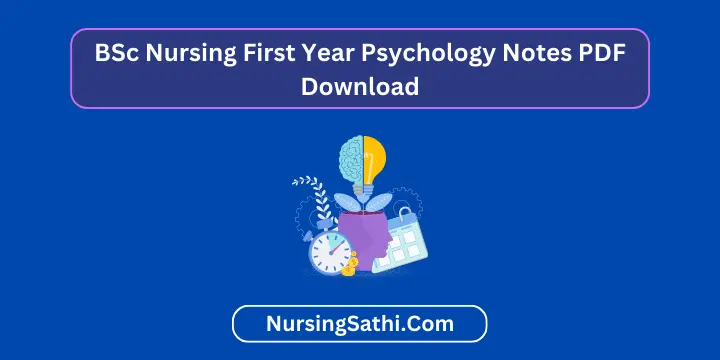
Students Also Read:
Table of Contents
Topic Wise BSc Nursing First Year Psychology Notes PDF Download
From the below section bsc nursing First Year psychology notes pdf is easily get without facing any problem just click on the download button.
BSc nursing psychology chapter 1 notes contain basic knowledge of psychology that is very important for fresher students. This unit covers the History, Scope, definition, and method of psychology etc.
Introduction Notes
The nervous system, Neurons, synapses and cortex, and Muscular and glandular controls of behaviour are the important topics in unit II that are covered in this PDF.
Biology of Behaviour
Cognitive processes.
Theories, motives & behaviour, conflicts of motivation, and theories, emotional adjustments; stressors, cycle, effect etc.
Motivation and Emotional Processes
Personality is one of the vital parts of BSc nursing first Year psychology notes Pdf. Read carefully these parts of psychology.
Personality
Developmental Psychology is another important part of the BSc nursing first Year psychology notes pdf that contains the psychology of vulnerable, individuals challenged, women, sick, and groups.
Developmental Psychology
Concepts, Promotive and Preventive Mental Health Strategies and services, Ego Defence mechanisms, and the Role of the nurse, These topics are available in PDF format.
Mental Hygiene & Mental Health
BSc nursing first Year psychology notes PDF unit 8 covered all tests and psychological assessments.
Psychological Assessment & Tests
What is psychology in bsc nursing.
Psychology in Nursing refers to the study of human behaviour and mind that’s related to nursing study. Psychology is the branch of nursing that focuses on the psychological characteristics of health, illness and how to treat the patients.
How to pass first-year BSC nursing?
1. At first make Notes every day in easy language. 2. Read your notes every day or revise them at least per week. 3. If any difficulty occurs in preparing notes then download them from our website Nursingsathi and study them. 4. Discuss with your friends what you learn. 5. Solve the previous year’s question paper. 6. Clear your doubts or confusion by watching YouTube videos or getting help from your friends.
Our website Nursing Sathi provides information /notes/Pdf that are freely available only for educational purposes. All articles/study materials /(e-PDF) are collected from our college professor, faculty, Internet and some of the other sources.
If BSc Nursing first Year psychology notes PDF was helpful then please rate and share your feedback. Your valuable feedback helps us to provide whole and better Nursing-related information.
Nursingsathi’s main goal or destination is to deliver trusty and honest information to Nurses. If our efforts touch your heart then please share this website with your friends, family, and other nursing students to help them with their Nursing journey.
If have you any queries regarding the article” BSc Nursing First Year Psychology Notes PDF Download Free in 2024 ” please comment on the below email or comment box.
4 thoughts on “BSc Nursing First Year Psychology Notes PDF Download Free in 2024”
Soft skill application chapter of psychology 1st semester b sc nursing
join our telegram channel, where we will upload this PDF.
Please upload remaining part of foundation & Psychology notes.
Ok, we will upload it as soon as possible.
Leave a Comment Cancel reply
Save my name, email, and website in this browser for the next time I comment.
- Partner with us
- Apply Online

Pirogov Medical University
The university.
- Recognitions
- Eligibility
- Fees Structure
Founded in 1906 in the city of Moscow, Pirogov Medical University—officially known as Russian National Research Medical University named after N. I. Pirogov— is one of the oldest medical universities in Russia. The first lecture took place on September 26, 1906, with 206 students, and the first graduation ceremony was celebrated in 1912. The University claims to be the first university in Russia that started offering medical education to women in the Russian Federation.It independently carries out various research projects in medicine and has received the status of National Research University in 2010.The Library of Pirogov Medical University has a collection of more than 7,50,000 books. For world-class clinical training and diverse practical exposure, the University collaborates with more 120 hospitals across the city of Moscow. Pirogov Medical University started accepting international students in 1959. Presently, more than 8,000 students are studying medicine at the University, out of which about 700 are international students. The University has a strong team of about 2,000 faculty members. Pirogov Medical University is approved by the Medical Council of India (MCI) and offers a 6-Year Program for MBBS in Russia. Students in India, who have qualified NEET, can apply for direct admission to the MBBS Program of Pirogov Medical University.
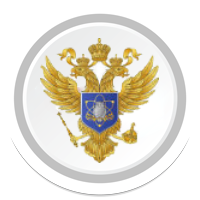
Ministry of Science and Higher Education, Russia
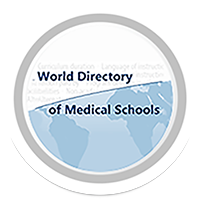
World Directory of Medical Schools (WDOMS)
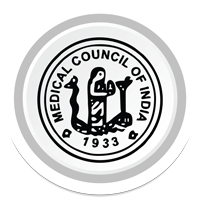
Medical Council of India (MCI)
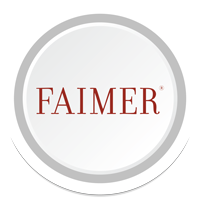
Foundation for Advancement of International Medical Education and Research (FAIMER)
To get admission to the MBBS Program of Pirogov Medical University, the student must qualify NEET-UG (National Eligibility cum Entrance Test-Undergraduate).
Besides NEET-UG, there is no requirement to go through any additional entrance examination.
RUS EDUCATION SUPPORT

INDIAN FOOD
MODERN CLASSROOMS
Medical Laboratories
Clinical Training
Recreational Facilities
Ensured Safety
FMGE (Foreign Medical Graduates Examination) Preparation
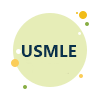
USMLE (United States Medical Licensing Examination) Preparation

- Pirogov Medical University was founded in 1906 in the Moscow city of Russia.
- In 1930, Pirogov Medical University organized the World’s first pediatric faculty.
- In 1963, Pirogov Medical University organized the World’s first biomedical faculty.
- In 2010, Pirogov Medical University received the status of National Research University.
- Presently, more than 8,000 students are studying at Pirogov Medical University, out of which about 700 are international students.
University Address
Mbbs program, admission & support, medical licensing examination support, student life.
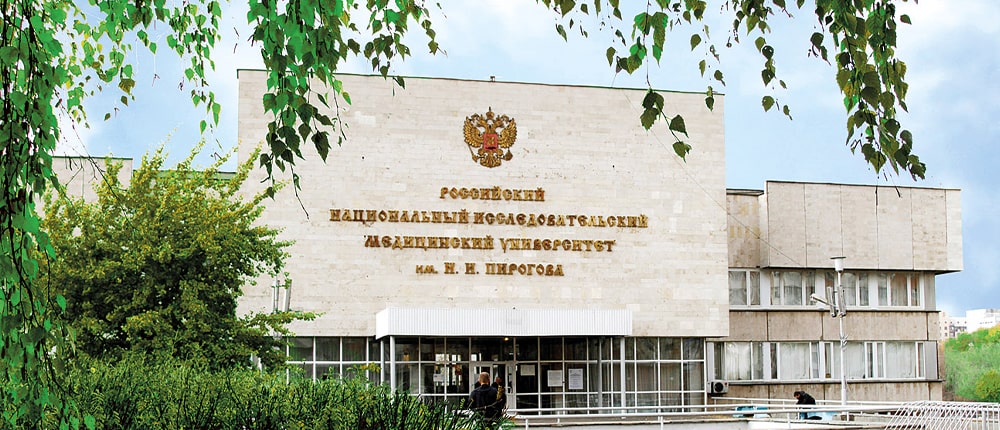
Founded in 1906 in the city of Moscow, Pirogov Medical University—officially known as Russian National Research Medical University named after N. I. Pirogov— is one of the oldest medical universities in Russia. The first lecture took place on September 26, 1906, with 206 students, and the first graduation ceremony was celebrated in 1912.
Focused on constantly improving the quality of education, the University entered the list of Times Higher Education World University Rankings and QS World University Rankings in 2019.
The University claims to be the first university in Russia that started offering medical education to women in the Russian Federation. Among all milestones achieved by the University, two most celebrated achievements are that Pirogov Medical University created the world’s first pediatric faculty in 1930 and the world’s first biomedical faculty in 1963.
To provide students and visitors a glimpse into the decades of the glorious history of the University, Museum of the History of Pirogov Medical University was established in 1981, which continues to capture astonishing achievements of the University, its students, and members.
The University maintains a leading position in Russia by actively participating in activities of medical research and healthcare and delivering excellence in medical education and care.
The University independently carries out various research projects in medicine and has received the status of National Research University in 2010. Conducting pre-clinical as well as clinical studies for a better understanding of human diseases, new medicines, and medical devices have been the center of research at Pirogov Medical University.
To keep the students and healthcare professionals updated on the latest research and innovations in medicine, the University publishes its own scientific journal with articles on biomedical sciences and clinical medicine.
The Library of Pirogov Medical University has a collection of more than 7,50,000 books. Students can also access scientific journals and eBooks through the electronic library system. In collaboration with other universities, academic mobility and exchange programs are also arranged for students to help them get experience in other institutions and build new connections.
For the healthcare of locals, the University operates clinical centers in Moscow. Students are provided hands-on clinical training in these University-operated clinics and also involved in various clinical studies. For world-class training and diverse practical exposure, the University collaborates with more 120 hospitals across the city of Moscow.
Pirogov Medical University started accepting international students in 1959. Until now, the University has trained more than 80,000 doctors. Presently, more than 8,000 students are studying medicine at the University, out of which about 700 are international students. The University has a strong team of about 2,000 faculty members.
Pirogov Medical University is listed in the World Directory of Medical Schools (WDOMS) and certified by the Educational Commission for Foreign Medical Graduates (ECFMG), United States of America. Pirogov Medical University is also approved by the Medical Council of Canada (MCC) and the Medical Council of India (MCI). The University offers a 6-Year Program for MBBS in Russia for local as well as international medical aspirants. Students in India, who have qualified NEET, can apply for direct admission to the MBBS Program of Pirogov Medical University.
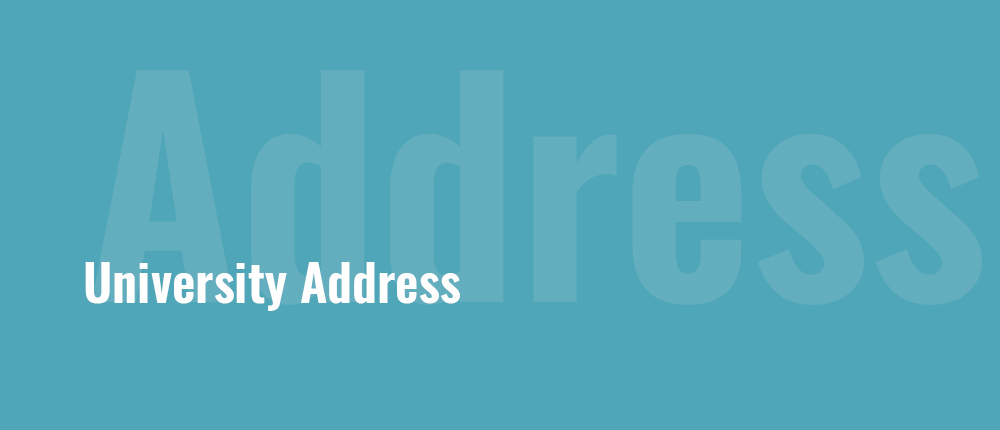
Pirogov Medical University Faculty of Medicine 1 Ostrovityanov Str Moscow, 117997 Russian Federation
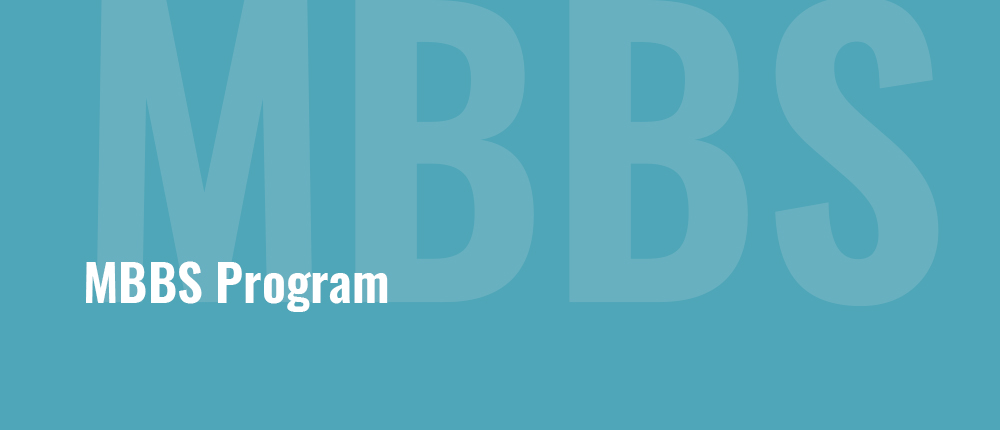
Pirogov Medical University offers a 6-Year MBBS Program in the Russian language. For international students, classes for initial years may be organized in English medium.
The Program for MBBS in Russia is focused on building a strong academic base with a pragmatic approach to education and medical research. To provide hands-on clinical experience, the students studying MBBS in Russia are involved in clinical training from the second year of MBBS. While education in classrooms and laboratories helps the students develop academic skills and sound theoretical understanding, clinical training in University-affiliated hospitals help them apply their knowledge into practice.

To get admission to the MBBS Program of Pirogov Medical University, you can apply online at Rus Education website.
Rus Education is duly authorized by the Russian Centre for Science and Culture (Cultural Department of The Embassy of the Russian Federation in India) to promote Russian Education among Indian Citizens. Rus Education is also an authorized associate of Pirogov Medical University. We facilitate one-window admission to the MBBS Program of Pirogov Medical University with no requirement of any donation or capitation and without any entrance examination.
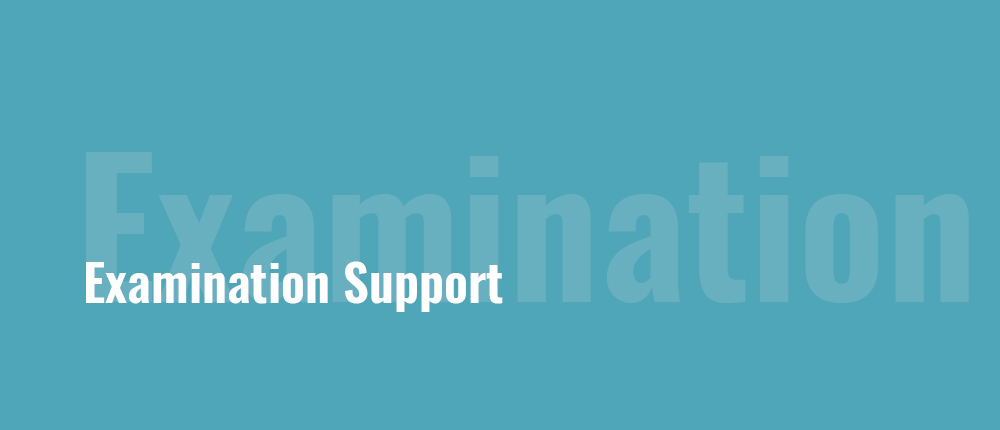
Pirogov Medical University offers a healthy student life and an opportunity to experience life in Moscow, the capital city of Russia, and also the most vibrant and exciting location in the largest country in the world!
For affordable accommodation of students and make their living experience safe and better, the University maintains a comfortable dormitory. Every room is shared by two or three students, and each floor has a shared kitchen where students can cook their food. Members of the dormitory help the newcomers to settle in their new homes. For the safety of the students, the University’s security team maintains 24-hour surveillance and is capable of providing emergency response, if required.
To help students adjust to life at university, it has a dedicated Student Support System in place. Every group of new students is assigned to two professors who guide the students not only about studying but about living as well, helping students adjust to the new environment and feel comfortable.
To keep students fit and active, Sports Center on the campus is equipped with facilities to play various sports, including badminton, basketball, volleyball, table tennis, swimming, football, hockey, chess, etc. Student can unleash their creativity by indulging in extracurricular adventures offered by Student Organizations and Societies. On the campus, there are ample opportunities for self-improvement and taking part in music, dance, sports competitions, and theater.
For peer support, the University has a Student Council in place which offers support in academic as well as non-academic matters making student life stress free.
For the social upliftment and help students connect with the society and local people, they are involved in community and welfare organized by the University, including medical outreach, health awareness programs, and blood donation camps. The University Volunteer Center organizes a number of volunteer activities to help students contribute to social causes.
Living in Moscow, students can explore its cultural heritage, museums, historic buildings, the world-famous Alexander Garden, and much more. For traveling in Moscow, students don’t face any problems, thanks to its convenient and cheap transportation system, especially the Moscow Metro.
With the charm of Moscow and all the student facilities and support services offered by the University, student life at Pirogov Medical University is a delight.
TOP MEDICAL UNIVERSITIES IN RUSSIA
.jpg)
Perm State Medical University
.jpg)
Tver State Medical University
.jpg)
Orenburg State Medical University

Mari State University
.jpg)
Siberian State Medical University
A php error was encountered.
Severity: Notice
Message: Undefined variable: countries
Filename: includes/footer.php
Line Number: 26
File: /home/mbbsinrussia/public_html/application/views/includes/footer.php Line: 26 Function: _error_handler
File: /home/mbbsinrussia/public_html/application/controllers/University.php Line: 46 Function: view
File: /home/mbbsinrussia/public_html/index.php Line: 315 Function: require_once
Severity: Warning
Message: Invalid argument supplied for foreach()
Message: Undefined variable: state
Line Number: 44
File: /home/mbbsinrussia/public_html/application/views/includes/footer.php Line: 44 Function: _error_handler
©2024-25 Rus Education.

IMAGES
VIDEO
COMMENTS
The syllabus of BSc Nursing in the second year comprises theoretical as well as practical subjects including assignments, viva-voce etc. The syllabus includes Psychiatric nursing, operation theater techniques, Pharmacology, pathology, Medical-Surgical Nursing which includes theoretical as well as practical. ... B.Sc Nursing students need to pay ...
Last Updated on: January 19, 2024 by Admin. This bsc nursing first Year nursing foundation notes PDF will provide you with a comprehensive overview of the key concepts that you will need to succeed in your bsc nursing program. Use these nursing foundation 1st Year notes With hard work and dedication, You will easily overcome the BSc nursing exams.
The beauty of these assignments is that they help prepare you for becoming a registered nurse. So, having an idea of what to expect can help go a long way. Below are the 13 most common assignments in BSC Nursing and the guidelines you can follow. Fundamental Communication Skills in Nursing The assignments here usually come in the form of essays.
RNs lead teams of nurses to care for patients in clinics, hospitals, and nursing homes. They work the day or night shift to monitor and treat caseloads of patients, including infants, adults, and the elderly. In 16 states, RNs also prescribe medications. An ADN or BSN degree is required to become a registered nurse. Salary: $73,300.
BSc in Nursing syllabus is a complete package for training specialists in the field of nursing. The syllabus includes both core subjects like Anatomy, Physiology, Nutrition, and Genetics, and also comprises additional subjects of courses like English, Computer Science, MBA, and Ethics. BSc Nursing is a 4-year long course, mostly divided into 8 semesters.
Adult Nursing (Bsc Nursing) 367 Documents. Students shared 367 documents in this course. University Birmingham City University. Academic year: 2021/2022. Uploaded by: JW. Jade Wressell. University of Lincoln. ... History of nhs Poster - assignment; Within the Nursing industry; Preview text. NUR.
Nursing degree: written assignment tips from prep to feedback. Advice from a nursing lecturer on how to maximise your chance of success in written assessments, including pitfalls to avoid and what to do if you miss the pass mark. Beverley Ramdeen. Posted 29 August 2023 - 16:57.
Key features. On successful completion of the BSc (Hons) Adult Nursing programme, you will be eligible to apply for Registration with the Nursing and Midwifery Council. Our Adult Nursing students gain the knowledge, abilities and skills to provide holistic care across a variety of settings with 50% of the course embedded in the practice setting.
The Department of Nursing is the first department of the First Moscow State Medical University named after I.M. Sechenov (Sechenov University), created to provide clinical training for students of the Faculty of Higher Nursing Education and Psychological Social Work (FVSO and SDP) in the direction of training 34.03.01 "Nursing" ( Bachelor ...
University and Program Search. Find the list of all universities to study Nursing in Russia with our interactive university search tool. Use the filter to list universities by subject, location, program type or study level.
RGUHS Blueprint question bank solutions of Medical Surgical Nursing 2 / MSN 2 for 3rd year B.Sc Nursing students . All type of questions and answers are included. Bsc.nursing100% (44) 9. RGUHS 2nd year B.Sc Nursing All Subject Solved Blueprint Question Bank ( Rajiv Gandhi University of Health Sciences, Bangalore )
Mandatory assignments. 100% (4) 3. RGUHS Community Health Nursing 1 Blueprint solutions for 2nd year bsc nursing. Bsc.nursing. Lecture notes. 100% (49) 2. RGUHS Sociology Blueprint solutions for 2nd year bsc nursing.
This BSc Nursing Notes PDF is made according to the syllabus. This Anatomy and Physiology Notes PDF is very helpful for internal exams, University exams, Viva-voice and interviews also. Fresher students don't know the syllabus, subjects, and exam pattern but don't worry we have provided the BSc Nursing 1st-year anatomy syllabus Pdf .
Staying up to date on nursing topics is an important task to keep in mind. Prof. R. P. Saxena founder of www.communityhealthnursing.guru has created this site during COVID-19 Pandemic for all Nursing students, Professional Nurses and Public to keep in touch with current trend in the subject of nursing to excel in their careers.
BSc Nursing 2nd Year syllabus contains seven subjects that are essential for bsc nursing Second Year students. Here we have mentioned all these subjects with their notes pdf. These subjects are (a) Sociology, (b) Pharmacology, (c) Pathology, (d) Genetics, (e) MSN (f) CHN (g) Communication and Educational Technology.
But don't worry we have to find a solution, we have provided mental health nursing pdf notes without any charge and these mhn notes are prepared in simple language. Students can take full advantage of these notes pdf and can bright their results utilizing these notes. Even you can see the all notes pdf of bsc nursing 3rd year.
The online nursing graduate certificates on this list cost between $442 and $1,765 per credit, and credit requirements vary drastically. A certificate in holistic nursing from UConn, which ...
Bsc nursing blaw 213. Kerala University of Health Sciences. 999+ Documents. Go to course. 7. DUTY Roster - Rohini. Bsc nursing 100% (27) 29. Unit -9- Reconstructive AND Cosmetic Surgeries. Bsc nursing 100% (25) 82. Antidote M3 TCON Union'21. Bsc nursing 100% (18) 17. Patient classification system.
What are the top Universities in Moscow? uniRank answers this question by publishing the 2024 uniRank University Ranking of 66 Moscow higher-education institutions meeting the following uniRank selection criteria:. being chartered, licensed or accredited by the appropriate Russian higher education-related organization; offering at least three-year bachelor's degrees or postgraduate master's or ...
From the below section bsc nursing First Year psychology notes pdf is easily get without facing any problem just click on the download button. BSc nursing psychology chapter 1 notes contain basic knowledge of psychology that is very important for fresher students. This unit covers the History, Scope, definition, and method of psychology etc.
The University offers a 6-Year Program for MBBS in Russia for local as well as international medical aspirants. Students in India, who have qualified NEET, can apply for direct admission to the MBBS Program of Pirogov Medical University. Pirogov Medical University. Faculty of Medicine 1 Ostrovityanov Str Moscow, 117997.
RGUHS Blueprint question bank solutions of Medical Surgical Nursing 2 / MSN 2 for 3rd year B.Sc Nursing students . All type of questions and answers are included. Bsc.nursing 100% ... Virginia Henderson Theory Of Nursing Assignment; Burn ,nursing management and intervention; Raynaud's decease - A condition affect the cardiovascular system; ...